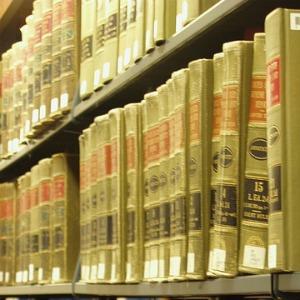BOB GARFIELD: Once, quite a while back, I was talking with an employee of the Commonwealth of Pennsylvania. He ended the conversation by informing me that, quote, “If you have any questions you can reach me telephonically.” [LAUGHING] Telephonically? That’s government-speak for “Give me a call.” And if the government can’t talk straight, it writes even worse. Your average communiqué from the government is packed with legalese, obfuscations and general abuse of the English language. It’s so bad that the government chose to regulate itself with the Plain Writing Act of 2010. The Act stipulates that Executive Branch documents should be written in plain, understandable language.
Dr. Annetta Cheek is the founder and chair of the Center for Plain Language that pushed for the passage of the act. A former writer of regulations herself, Cheek took up the cause after chancing upon a single revelatory document.
ANNETTA CHEEK: At one point I was introduced by a colleague to a reg that he was working on about offshore oil and gas leasing. And I knew absolutely nothing about the topic but I was able to understand the regulation, which was almost, at that time, sort of against the law, that you could understand a federal regulation that you knew nothing about. And it was one of those ah-ha moments. Since then I’ve become sort of fanatic. You know, why can’t all federal regulations be written this clearly?
BOB GARFIELD: Let’s talk for a moment about what we are up against. I’m gonna read you a regulation from the National Parks Service. In its original form it sounded like this: “When the process of freeing a struck vehicle that has been stuck results in ruts or holes, the operator will fill the rut or hole created by such activity before removing the vehicle from the immediate area.”
ANNETTA CHEEK: Right.
BOB GARFIELD: The rewritten version sounds like this: “If you make a hole while freeing a stuck vehicle, you must fill the hole before you drive away.” That’s better.
ANNETTA CHEEK: It certainly is but it’s very hard to get from that first version to the second version.
BOB GARFIELD: And where does this come from, this impenetrable bureaucratese? Is it cultural? Is there a legal underpinning to it?
ANNETTA CHEEK: Yes and yes. My background is in anthropology, and to me it is part of the government culture that sounds formal, it sounds official. And, of course, there is a legal aspect. Attorneys for the government are always very concerned about making sure that their regulation can stand up in court, and they really aren’t concerned about the person who has to read the regulation and implement it.
BOB GARFIELD: In fulfillment of your grand vision for clarity in government language came the Plain Writing Act of 2010, which I guess is good news but there’s a bad news part of this. There was a piece in The Washington Post that estimated that there’s only, at this stage, 10 percent compliance. Does that sound about right to you?
ANNETTA CHEEK: Maybe it’s overly optimistic.
BOB GARFIELD: Yikes.
[LAUGHTER]
I want to ask you about backlash. You know, when they rewrote the Lord’s Prayer to make it more accessible to 20th century speakers, it ruffled some feathers because it just didn’t sound ecclesiastical enough.
ANNETTA CHEEK: Right.
BOB GARFIELD: Is there a chance that there will be resistance to the kind of clarity and straightforwardness that you so prize?
ANNETTA CHEEK: Absolutely. Most of it will come from the writers. I don’t think too much of it would come from the reader. Even though maybe some people in the government think that they are deities, I don’t think most of the public feels that.
A little anecdote: Back in the, the late Clinton Administration, we were trying to get people in the White House to agree to a plain language style guide for executive orders. Executive orders tend to be particularly impenetrable. But then the attorney who reviewed these said, “Oh, we cannot write presidential executive orders in plain language because it’s not magisterial.”
BOB GARFIELD: I will assert that sometimes there is poetry in gobbeldy-gook. I’m going to read perhaps the most famous paragraph in American governmental language. It goes like this: “When in the course of human events it becomes necessary for one people to dissolve the political bonds which have connected them with another and to assume the powers of the earth, the separate and equal station to which the laws of nature and nature’s God entitle them, a decent respect to the opinions of mankind requires that they should declare the causes which impel to the separation.” Now, that’s from the Declaration of Independence, Annetta.
ANNETTA CHEEK: Right, right.
BOB GARFIELD: Our producer, Chris Neary, rewrote that, trying to channel you, and here’s what he came up with.
[CHEEK LAUGHS]
“It’s time to break free from England because it’s our God-given right to do that. We’re every bit as good as they are, but it’s only fair we explain why we gotta do this thing.
ANNETTA CHEEK: [LAUGHS]
BOB GARFIELD: It sounds pretty un-magisterial.
ANNETTA CHEEK: It’s hard to evaluate writing from that long ago in today’s context because that was more normal writing back then than, you know, it would be now. On the other hand, I think if the government were writing that paragraph today it would have a lot more words.
BOB GARFIELD: Do you think John Adams was standing over Thomas Jefferson’s shoulder and saying, “Dude, it doesn’t sound quite pompous enough, throw in another equal station?”
ANNETTA CHEEK: [LAUGHS] Possibly.
BOB GARFIELD: Annetta, thank you very much.
ANNETTA CHEEK: You’re certainly welcome. I love talking about plain language. I’ll do it anytime.
BOB GARFIELD: Annetta Cheek is the founder and chair of the Center for Plain Language, which is staging a Plain Language in Law Conference in Washington, D.C., May 21st to 23rd at the National Press Club.
